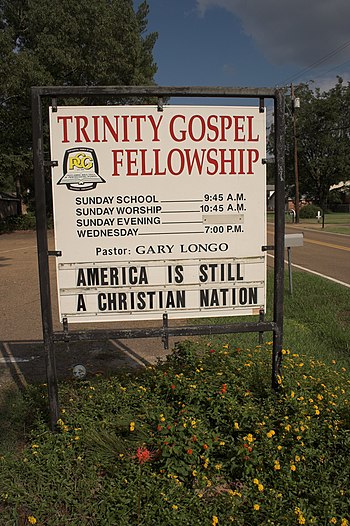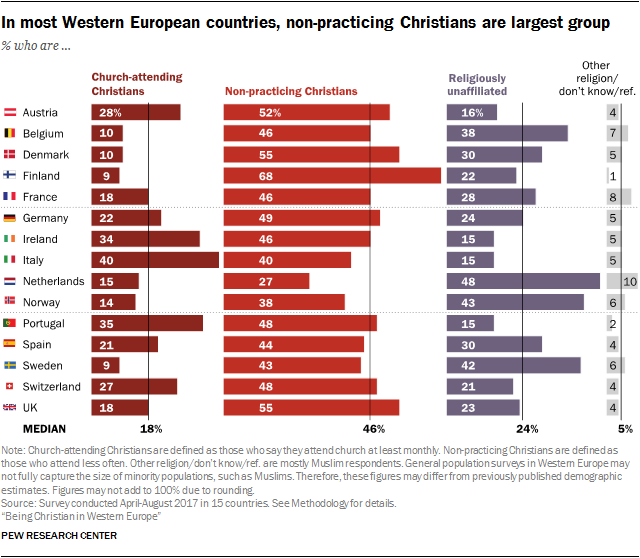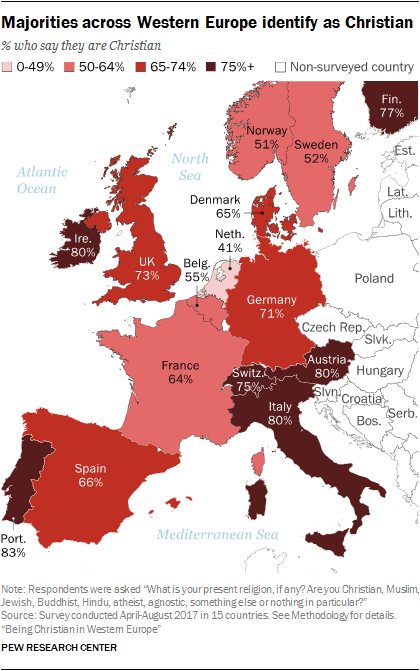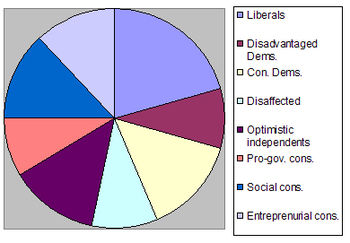 |
| "And don't ye forget it" Sign in Jackson, Mississippi for "Trinity Gospel Fellowship" has lettering "AMERICA IS STILL A CHRISTIAN NATION" (Photo credit: Wikipedia) |
The nonpartisan
Public Religion Research Institute released new data on
American perspectives on what makes someone truly American and what
makes the U.S. unique in the world.
The survey found that a majority (63
percent) of Americans believe that protests challenging unfair
treatment by the government make the country a better place. However,
perspectives among
white Americans on protests change dramatically when
the
protesters are identified as black. Two-thirds (67 percent) of white
Americans believe that public protests against mistreatment by the
government improve the country, but fewer than half (48 percent) of
whites say the same when asked specifically about black Americans
speaking out against mistreatment.
The nationwide survey of 1,007 adults was conducted from June 10 to
June 14, 2015. The survey measures public views on patriotism, the role
that protest plays in improving our country, what makes someone “truly
American,” America’s moral standing,
discrimination against Christians
in the U.S. and immigration.
the idea that Americans believe they are a preferred nation by
God is confirmed by the ciphers of the review. More than six in ten (62 percent) Americans believe that God has
granted the country a special role in human history.
We also know the Americans to be a proud race, finding their country the best in the world. They often also carry strange ideas about other countries which do not coincide with reality. but even when some things may be better in other countries 63
percent of U.S. adults say there has never been a time when they were
not proud to be an American. At the same time, only 43 percent of
Americans believe that the U.S. sets a good moral example for the world,
while 53 percent disagree.
About those morals and ethics is a lot of discussion going on in the Christian American community. Several Christians there do believe they are the higher race and the better people of the world. They also consider that those who want to come to live in America should all take on their own belief, which they consider the only true faith.
Though there they seem to be in conflict with themselves and their nation, because most Americans do not believe the U.S. is a
Christian nation any more. Often they want to refer to their founding fathers being real Christians having founded their Christian Nation. But with the years they do find the government went astray from the ruling of the pilgrims and founding fathers.
Only
about one-third (35 percent) say that the U.S. is a Christian nation
today, while 14 percent say that the U.S. has never been a Christian
nation. Nearly half (45 percent) of the public believes that it once was
a Christian nation but is not any-more. However, among Americans who
believe the U.S. is no longer a Christian nation, most (61 percent) say
this change is a bad thing.
Close to seven in ten (69 percent) say that believing in God is essential to a truly American identity. those who do not belief in God the Christian way of trinitarianism, can not be real believers nor real Americans. Not accepting the trinity seems blasphemy for most Americans, who do not seem to know there are many sorts of non-trinitarian religious groups.
“Young adults are roughly half as likely as seniors to say that being
Christian is an important part of the American identity. Young adults
are also much less likely to believe the U.S. is a Christian nation, an
idea largely embraced by older Americans.”
says Dan Cox, Research Director at Public Religion Research Institute.
Younger and older Americans disagree sharply over what they believe is
central to being American. While roughly two-thirds (66 percent) of
seniors (age 65 and older) say that being a Christian is an important
part of being American, only about one-third (35 percent) of young
adults (age 18 to 29) agree. More than three-quarters (77 percent) of
seniors say believing in God is an important part of the American
identity, while young people are closely divided: 52 percent say that
believing in God is an important part of being American, while 45
percent say that it is not. A significant divide also exists when it
comes to place of birth. While 67 percent of seniors say that being born
in the U.S. is important, fewer than half (45 percent) of young
Americans agree.
When we do hear Americans protesting about the ways going on in their country and how they do not like it how the government handles religious issues we can find under the forty-nine percent of the Americans
surveyed, who believe that discrimination against Christians is becoming as
big of a problem as discrimination against other groups, we see that most of them can not stand it that others have different ideas about faith than they. Lots of American Christians would like to see all Christians all over the world to think like they. Those who only believe in the One True God Jehovah, can not be real Christians according lots of them, because Jesus is God and was the first Christian killed by the
Jews, which are trying to conquer the world again.
Out of all the white evangelical
Protestants surveyed, 70 percent said Christian discrimination has
become a serious issue, while just 28 percent disagreed. Several evangelical protestants do not like to argue and consider each discussion about their faith as an attack on their faith but also as an attack on the American freedom of speech, though they do not want others to give their right of speech.
We also see that after 9/11 the stand against
Muslims has not yet improved much. Many consider the Islam a great danger and even think their president has Muslim connections which he hides to bring in the Muslim warriors and give them more power.
According to the
just-released survey of Muslims, a majority (51%) agreed that “Muslims in America should have the choice of being governed according to shariah.”
This is naturally a matter which would bring lots of Americans and Europeans to have their ears and eyes wide open questioning the liberty of men and women. When that question was put to the broader U.S. population, the
overwhelming majority held that shariah should not displace the
U.S.
Constitution (86% to 2%).
We do think Americans are probably too much worried because more than half (51%) of U.S. Muslims polled also believe either
that they should have the choice of American or shariah courts. Though they could have reason when there are also may who think they should have their own tribunals to apply shariah, because only 39% of those polled said that Muslims in the U.S. should be subject to American courts.
These notions were powerfully rejected by the broader population
according to the Center’s earlier national survey. It found by a margin
of 92%-2% that Muslims should be subject to the same courts as other
citizens, rather than have their own courts and tribunals in the
U.S.
Several Christians want to ring the alarm bell because according to them it is estimated that the number of Muslims in the United States was 2.75
million in 2011, and growing at a rate of 80-90 thousand a year.
If
those estimates are accurate, the United States would have approximately
3 million Muslims today. That would translate into roughly 300,000
Muslims living in the United States who believe that shariah is “The
Muslim God Allah’s law that Muslims must follow and impose worldwide by
Jihad.” {Poll of U.S. Muslims Reveals Ominous Levels Of Support For Islamic Supremacists’ Doctrine of Shariah, Jihad}
People
unaffiliated with Christianity leaned more toward discrimination not
being as big of a problem as discrimination against other groups, as 59
percent disagreed with the statement with only 34 percent agreeing.

















































